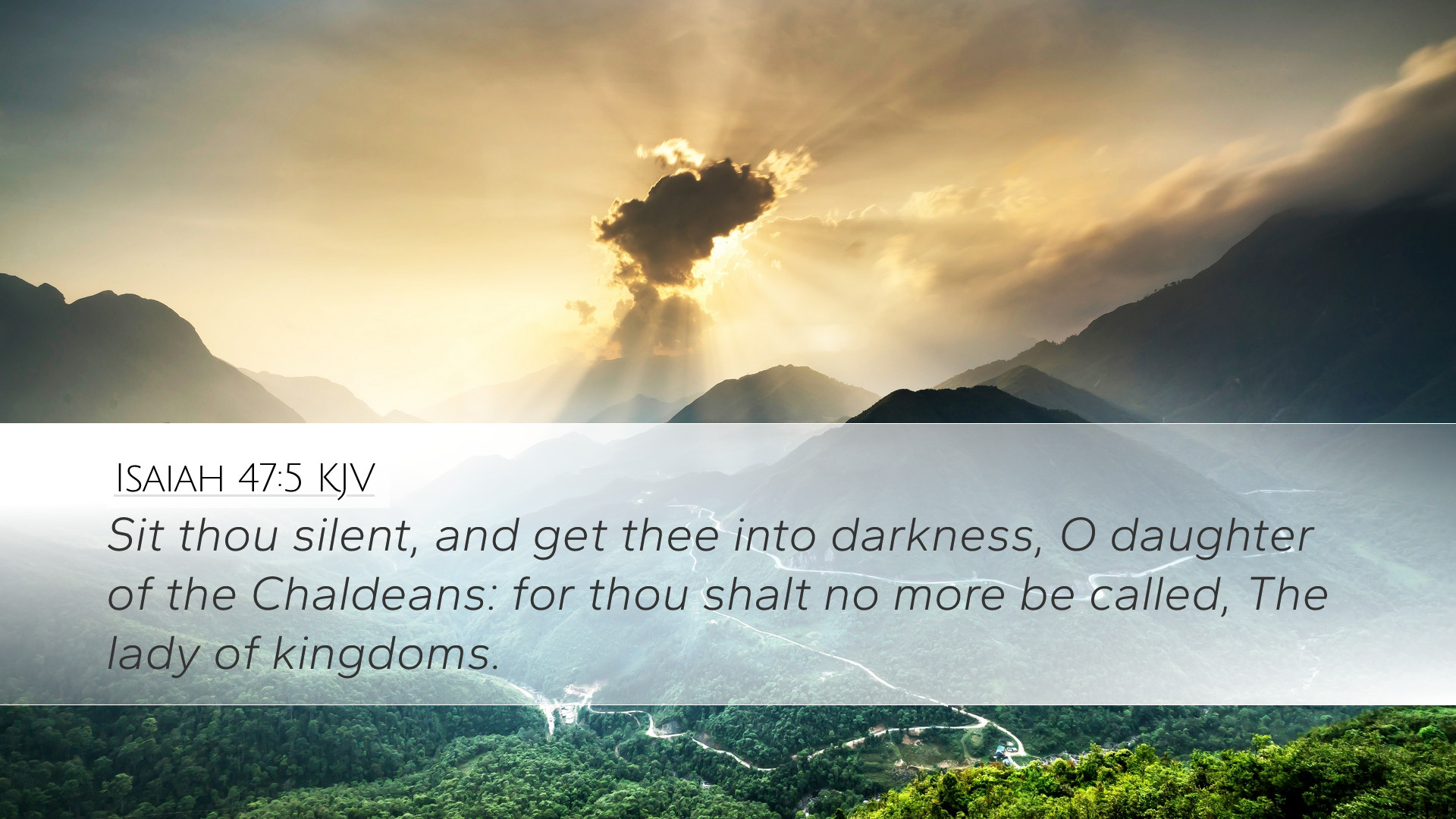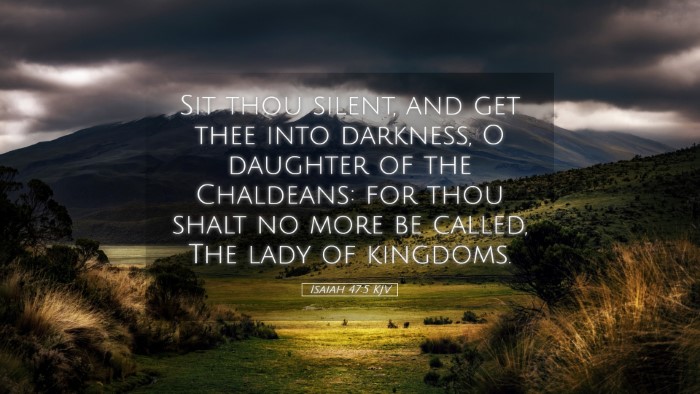Commentary on Isaiah 47:5
Isaiah 47:5 states, "Sit thou silent, and get thee into darkness, O daughter of the Chaldeans: for thou shalt no more be called, The lady of kingdoms." This passage carries a significant weight in the context of prophetic judgment against Babylon, emphasizing themes of pride, judgment, and the eventual fall of great powers.
Contextual Overview
The verses preceding Isaiah 47 depict the exaltation and eventual downfall of Babylon. The Chaldeans, renowned for their pride and oppression, are warned of their impending judgment from God. This prophecy serves as a stark reminder of the sovereignty of God over nations and empires.
Insights from Public Domain Commentaries
Matthew Henry's Commentary
Matthew Henry emphasizes the solemnity of Babylon's fall. He notes that God's judgment leads to silence and darkness for the once-mighty nation. Henry writes:
"The fall of Babylon was a type of the fall of the Antichrist, which will likewise be a dreadful fall; and for this reason, God calls her to sit in silence and darkness, indicating the complete removal of her glory and power."
He further comments on the term "daughter of the Chaldeans." This indicates not only the physical descendants but also the moral and spiritual faults of the people, attributing the forthcoming darkness to their rebellion against God.
Albert Barnes' Notes on the Bible
Albert Barnes highlights the significance of the command to "sit thou silent." He interprets this as a call for Babylon to recognize its humility following a period of profound pride:
"This silence is emblematic of the utter desolation that shall come upon them. No more boasting, no more declarations of superiority; they will find themselves utterly defeated and subjugated."
Barnes also expands on the notion of darkness, suggesting it represents both physical darkness and a spiritual state of despair. The loss of their title, "The lady of kingdoms," is profound as it encapsulates their entire identity which was built on pride and dominance.
Adam Clarke's Commentary
Adam Clarke delves deeper into the metaphoric use of light and darkness. He writes:
"The transition from light to darkness symbolizes the shift from glory to shame, and proclaims a divine message that Babylon, once a beacon of power, shall now experience utter obscurity."
Clarke also points out the heretical invocations of Babylon, attributing their downfall to the arrogance of its false gods:
"This is a clear indication that divine retribution is inescapable. The very gods that they relied upon shall be impotent in their hour of need."
Theological Themes
This verse encapsulates critical theological themes relevant for both contemporary and historic scholarship:
- The Sovereignty of God: The passage underscores God's control over the rise and fall of nations, which is a recurrent theme throughout the Book of Isaiah.
- The Nature of Pride: The pride of Babylon serves as a cautionary tale about the dangers of hubris and self-exaltation in contrast to humility before God.
- Judgment and Restoration: While the verse highlights impending darkness and silence, it simultaneously foreshadows the restoration of God's people after the fall of Babylon, emphasizing a future hope.
Practical Implications for Today
For pastors, students, and theologians today, Isaiah 47:5 serves as a foundational text urging reflection on the nature of power and divine authority:
- Humility in Leadership: Leaders are called to recognize that their authority ultimately derives from God. Pride leads to downfall, highlighting the necessity of humility.
- Warning against Idolatry: Just as Babylon was led astray by false gods, modern believers are reminded to reject contemporary idols—whether they be materialism, power, or fame.
- Hope in Judgment: The promise of restoration following judgment cultivates hope among believers, assuring them that God is not just a God of wrath but also of redemption.
Conclusion
Isaiah 47:5 presents a profound message about the consequences of national pride and reliance on falsehood. The insights drawn from public domain commentaries enrich our understanding of this passage, revealing not only the historical context of Babylon's fall but also its enduring relevance. As we meditate on this verse, let us strive for humility and remain vigilant against the pitfalls of arrogance, looking forward to the promise of God's restoration for His people.


